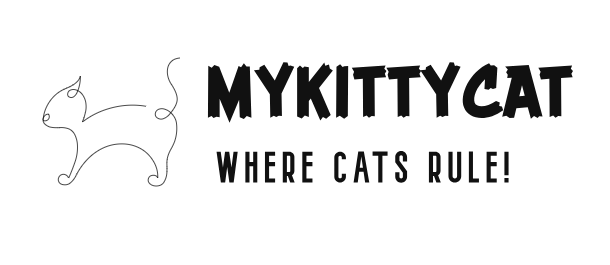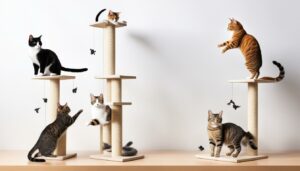Cat lovers know that felines can be mysterious creatures. They can be aloof and independent, but also affectionate and playful. Understanding cat behavior is crucial for providing the best care for your furry friend. This article will explore cat behavior during pregnancy and at different ages, as well as the factors that influence their behavior. It will also provide tips on how to support your cat and common behavioral problems and solutions.
During pregnancy, cats may display changes in behavior. They may become more affectionate, clingy, or aggressive at times. Pregnant cats may also hide more, sleep more, become hungrier, and demand more attention from their owners. It is important to be aware of these changes and provide your cat with the support and care they need during this time.
Cats’ behavior can also vary depending on their age. Kittens are playful and curious, while adult cats are more independent and may sleep more. Senior cats may become less active and more vocal. Understanding your cat’s behavior at different ages can help you provide the appropriate care and attention they need.
Key Takeaways
- Understanding cat behavior is crucial for providing the best care for your furry friend.
- During pregnancy, cats may display changes in behavior such as becoming more affectionate, clingy, or aggressive at times.
- Cats’ behavior can vary depending on their age, and it is important to understand their behavior at different ages to provide appropriate care.
Understanding Cat Behaviour
Understanding cat behavior is essential, especially when it comes to pregnancy. Cats are known for their independent nature, but they also require attention and care, especially during pregnancy. Here are some key things to keep in mind when it comes to cat behavior at different stages of their lives.
Kitten Behavior
Kittens are playful and curious creatures. They love to explore and often get into trouble, so it’s important to keep an eye on them. They also require a lot of attention and playtime to help them develop social skills and bond with their owners. Kittens may also exhibit some aggressive behavior, such as biting and scratching, but this is usually just a result of their playful nature.
Adult Cat Behavior
Adult cats are generally more independent than kittens. They still require attention and care, but they also enjoy their alone time. Adult cats may also exhibit some territorial behavior, such as marking their territory by scratching furniture or spraying urine around the house. They may also become more vocal and demand attention from their owners.
Pregnant Cat Behavior
Pregnant cats require extra care and attention. They may become more affectionate and clingy, and they may also exhibit some aggressive behavior at times. Pregnant cats may also hide more often, sleep more, become hungry more often, and be all over their owners. They may also become nervous or excited when they are close to giving birth.
Overall, understanding cat behavior is key to providing the best care for your feline friend, especially during pregnancy. By paying attention to their behavior and providing them with the care and attention they need, you can ensure that your cat remains healthy and happy.
Related Posts:
Cat Behaviour During Pregnancy
Cats are known for their independent nature, but they can become more affectionate and clingy during pregnancy. As the pregnancy progresses, their behavior may change, and they may display nesting behaviors and seek out a safe and quiet place to give birth. Here are the different stages of cat behavior during pregnancy:
Early Pregnancy
During the early stages of pregnancy, a cat’s behavior may not change much. However, some cats may become more affectionate and seek out more attention from their owners. They may also display nesting behaviors, such as rearranging blankets and towels to create a comfortable spot to rest.
Mid Pregnancy
As the pregnancy progresses, a cat’s behavior may become more pronounced. They may become more vocal and meow more frequently, seeking attention and affection from their owners. They may also become more restless and pace around the house, trying to find the perfect spot to give birth.
Late Pregnancy
In the final stages of pregnancy, a cat’s behavior may change dramatically. They may become more aggressive and defensive, especially if they feel threatened or if their nesting area is disturbed. They may also start to groom themselves excessively, preparing for the birth of their kittens.
It’s important to provide your pregnant cat with a safe and comfortable space to give birth. This can be a designated area in your home, such as a closet or spare room, where your cat can feel secure and protected. You should also provide plenty of food and water, as pregnant cats need additional calories and nutrients to support their growing kittens.
In conclusion, a cat’s behavior during pregnancy can vary depending on the stage of pregnancy. It’s important to provide your pregnant cat with the care and attention she needs to ensure a safe and healthy pregnancy and delivery.
Cat Behaviour at Different Ages
Cats go through three main stages of aging: kittenhood, adulthood, and senior years. Each stage is characterized by different behaviors, nutritional needs, and veterinary care.
Kitten Behaviour
Kittens are playful and curious creatures. They love to explore their surroundings and play with toys. They also have a lot of energy and need plenty of playtime and exercise to keep them healthy.
During this stage, kittens are also learning important socialization skills. They need to interact with other cats and humans to develop their social skills. Kittens may also display some undesirable behaviors like biting, scratching, and climbing on furniture. It is important to teach them appropriate behaviors and provide them with plenty of scratching posts and toys to redirect their energy.
Adult Cat Behaviour
Adult cats are generally more relaxed than kittens. They still enjoy playtime and exercise, but they also like to spend time lounging and napping. Adult cats may also display some territorial behaviors like marking their territory with urine or scratching furniture.
During this stage, cats may also develop some health issues like dental problems, arthritis, and obesity. It is important to provide them with a balanced diet and regular veterinary care to keep them healthy.
Senior Cat Behaviour
Senior cats may become less active and more sedentary. They may also develop some health issues like kidney disease, diabetes, and hyperthyroidism. Senior cats may also experience some cognitive decline and may become less social.
During this stage, it is important to provide them with a comfortable and safe environment. Senior cats may also benefit from a special diet and supplements to support their health. Regular veterinary care is also important to monitor their health and address any issues that may arise.
Overall, cats display different behaviors at different ages. Understanding these behaviors and providing appropriate care can help ensure a happy and healthy life for your feline companion.
Factors Influencing Cat Behaviour
A cat’s behaviour during pregnancy can be influenced by various factors. Here are some of the most common factors that can affect a cat’s behaviour during pregnancy:
Age of the Cat
The age of the cat can play a significant role in how she behaves during pregnancy. Younger cats may not be as experienced with pregnancy and may show signs of anxiety or restlessness, while older cats may be more relaxed and calm during pregnancy.
Breed of the Cat
Different cat breeds have different behavioural traits. Some breeds may be more active and playful, while others may be more laid-back and reserved. This can affect how a cat behaves during pregnancy. For example, an active breed may continue to play and run around during pregnancy, while a more relaxed breed may prefer to rest and sleep more.
Environment
The environment in which a cat lives can also affect her behaviour during pregnancy. A calm and quiet environment can help a pregnant cat feel more relaxed and comfortable, while a noisy or chaotic environment may cause stress and anxiety.
Health of the Cat
The health of the cat can also play a role in her behaviour during pregnancy. A cat that is in good health may be more active and playful during pregnancy, while a cat that is experiencing health issues may be more lethargic and less active.
Nutrition
Proper nutrition is important for a pregnant cat’s health and can also affect her behaviour. A well-nourished cat may be more active and playful during pregnancy, while a cat that is not getting enough nutrients may be more lethargic and less active.
In conclusion, several factors can influence a cat’s behaviour during pregnancy, including age, breed, environment, health, and nutrition. It is important to provide a calm and comfortable environment for a pregnant cat and ensure she is getting proper nutrition and veterinary care.
How to Support Your Cat
During pregnancy, your cat needs extra care and attention to ensure a healthy pregnancy and delivery. Here are some tips to support your cat during this time:
Provide a Safe and Comfortable Environment
Your cat will need a quiet and comfortable space to rest during her pregnancy. Make sure she has access to a clean litter box, fresh water, and a cozy bed. Consider setting up a nesting box in a quiet area of your home where she can give birth.
Feed a Nutritious Diet
A pregnant cat needs a balanced and nutritious diet to support the growth of her kittens. Talk to your veterinarian about the best diet for your cat during pregnancy. It’s important to feed her small, frequent meals throughout the day to prevent her from becoming too hungry or too full.
Monitor Her Health
Keep a close eye on your cat’s health during pregnancy. Schedule regular check-ups with your veterinarian to monitor her weight, blood pressure, and overall health. Watch for any signs of distress or complications, such as lack of appetite, lethargy, or difficulty breathing.
Provide Plenty of Love and Attention
Your pregnant cat may crave extra attention and affection during this time. Spend time with her, pet her, and talk to her to help her feel loved and supported. However, be mindful of her mood swings and don’t force her to interact if she’s not in the mood.
By providing a safe and comfortable environment, a nutritious diet, monitoring her health, and giving her plenty of love and attention, you can help your cat have a healthy and happy pregnancy.
Common Behavioural Problems and Solutions
Cats, like any other animal, can exhibit behavioural problems at any age. These problems can range from mild to severe and can include aggression, destructive behaviour, inappropriate urination, and excessive meowing. Here are some common behavioural problems that cats may experience and possible solutions:
Aggression
Cats can become aggressive for a variety of reasons, such as fear, territorial behaviour, or frustration. To help alleviate aggression, it is important to identify the cause and address it appropriately. Some possible solutions include:
- Providing a safe and secure environment for the cat
- Avoiding stressful situations that may trigger aggressive behaviour
- Using positive reinforcement training techniques to encourage good behaviour
- Consulting with a veterinarian or animal behaviourist for additional support and advice
Destructive Behaviour
Cats may exhibit destructive behaviour, such as scratching furniture or chewing on cords, due to boredom, anxiety, or territorial behaviour. To help address destructive behaviour, some possible solutions include:
- Providing appropriate toys and activities to keep the cat entertained
- Providing a scratching post or other appropriate outlet for scratching behaviour
- Using deterrents, such as double-sided tape or bitter sprays, to discourage destructive behaviour
- Consulting with a veterinarian or animal behaviourist for additional support and advice
Inappropriate Urination
Cats may urinate outside of their litter box for a variety of reasons, such as medical issues, territorial behaviour, or anxiety. To help address inappropriate urination, some possible solutions include:
- Providing a clean and accessible litter box
- Identifying and addressing any underlying medical issues
- Using pheromone sprays or diffusers to help reduce anxiety and stress
- Consulting with a veterinarian or animal behaviourist for additional support and advice
Excessive Meowing
Cats may meow excessively due to boredom, anxiety, or attention-seeking behaviour. To help address excessive meowing, some possible solutions include:
- Providing appropriate toys and activities to keep the cat entertained
- Establishing a routine for feeding and playtime to reduce anxiety
- Ignoring excessive meowing behaviour and rewarding quiet behaviour
- Consulting with a veterinarian or animal behaviourist for additional support and advice
By identifying and addressing behavioural problems early on, cat owners can help ensure a happy and healthy life for their furry friends.







